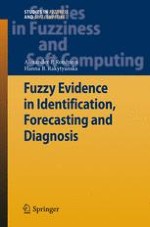2012 | OriginalPaper | Chapter
Fuzzy Relations Extraction from Experimental Data
Authors : Alexander P. Rotshtein, Hanna B. Rakytyanska
Published in: Fuzzy Evidence in Identification, Forecasting and Diagnosis
Publisher: Springer Berlin Heidelberg
Activate our intelligent search to find suitable subject content or patents.
Select sections of text to find matching patents with Artificial Intelligence. powered by
Select sections of text to find additional relevant content using AI-assisted search. powered by
In this chapter, a problem of fuzzy genetic object identification expressed mathematically in terms of fuzzy relational equations is considered.
Fuzzy relational calculus [1, 2] provides a powerful theoretical background for knowledge extraction from data. Some fuzzy rule base is modelled by a fuzzy relational matrix, discovering the structure of the data set [3 - 5]. Fuzzy relational equations, which connect membership functions of input and output variables, are built on the basis of a fuzzy relational matrix and Zadeh’s compositional rule of inference [6, 7]. The identification problem consists of extraction of an unknown relational matrix which can be translated as a set of fuzzy IF-THEN rules. In fuzzy relational calculus this type of problem relates to inverse problem resolution for the composite fuzzy relational equations [2]. Solvability and approximate solvability conditions of the composite fuzzy relational equations are considered in [2, 8, 9]. While the theoretical foundations of fuzzy relational equations are well developed, they call for more efficient use of their potential in system modeling. The non-optimizing approach [10] is widely used for fuzzy relational identification. Such adaptive recursive techniques are of interest for the most of on-line applications [11 - 13]. Under general conditions, an optimization environment is the convenient tool for fuzzy relational identification [14]. An approach for identification of fuzzy relational models by fuzzy neural networks is proposed in [15 - 17].
